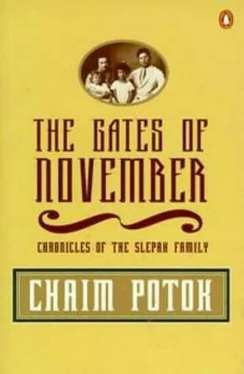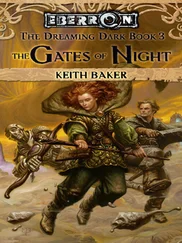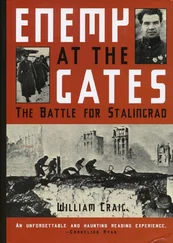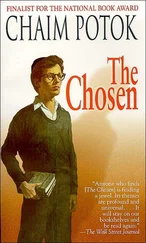In the summer of 1995 my wife and I visited them in the Pocono Mountains of Pennsylvania. They were spending a month in a house rented by Leonid. Deep inside a dense green world of oaks and white birches and elms and maples and evergreens, beneath a glittering blue sky, and in air so clear it seemed an intoxicating miracle each time one breathed, there, on the front deck, reclining on a chaise, was Volodya, reading a Russian book Leonid had brought back from a recent business trip to Moscow: Polygons of Satan: Crimes of the Communist Party by Igor Bunich, published in 1994 in Rostov-on-Don. On the cover was a picture of the young, bearded, aggressive Trotsky.
Volodya and Masha, looking remarkably robust, were cheerful, relaxed, given easily to hearty laughter. But I knew he had suffered a mild heart attack some months before and she was losing vision in one eye. Leonid had once told me that his father referred lightly to their various illnesses as “telephone calls from the other world.”
Did their neighbors know who they were, these strangers in this Pennsylvania mountain village? To look at them-Volodya in a white polo shirt and baggy chinos and padding about in his bare feet; Masha in a dark blue linen skirt and a gauzy light pink sleeveless blouse and wearing clogs-who would think that once they had been among the leaders of a movement that had hurled itself against, and helped bring down, the Soviet colossus?
Masha prepared a green salad and cooked a pot of rice after a recipe taught her by an Israeli American visitor to their apartment in Israel. Outside, two deer emerged from the bluish green shadows of the woods and nibbled at the grass in front of the house.
We sat around a table, and they talked of their lives in apartment 7, Rivka Guber Street, Kfar Saba, the municipality near Tel Aviv where they now lived. Masha’s Hebrew is now quite good; Volodya is more comfortable with English. In Kfar Saba, they said, there were new lights in the park near the apartment house, and on warm nights one could hear the high-pitched voices of children playing on the grass. Yes, the elementary school and home for the aged were still there, and nothing had changed in the bus station on the boulevard; it was the same busy, dusty place. In the apartment building lived people from America, Russia, Iraq, Iran, Yemen, Poland, Argentina, England, as well as native-born Israelis. A school principal, engineers, teachers, a retired professor of physiology, a fax machine technician, an IBM department head, an architect, a pharmacist, a physician, a tourist bus driver, the owner of a picture-framing shop, an accountant. The apartment house was a sprawl of connected tall white buildings with separate entrances; on warm days voices spilled from the open windows and mixed with the sounds of traffic on the boulevard and the voices of children in the park. Most of their family now lived in Israel -siblings, nieces, nephews, cousins-and the telephone in the apartment was often busy.
As the conversation ebbed and flowed around the subject of their family, one sensed in Volodya and Masha a subdued bewilderment and pain. They seemed unable to comprehend how it had happened: the separation between them and their sons. After all they had endured, now to be connected to their sons for most of the year only by telephone. And unable to call at a mere whim. Overseas telephone calls were costly. Their lives now brushed the borders of indigence, and they needed to be careful with their expenses. The Kremlin had robbed them of their most productive years. They came to Israel too late in life to have worked the minimum ten years necessary for a retirement pension. Nor could they have resumed their professions. Volodya had fallen behind nearly two decades in his field of engineering; when he tried to return to it in Israel, at the age of sixty, he found himself in a stupefying new world of technology, the disparity made even greater by the more rigorous requirements of Western engineering. Utterly futile to start training again at that age. The same was true of Masha. He obtained an engineering position in a laboratory at Tel Aviv University; she found work as a radiologist in the Kfar Saba hospital. Upon their retirement, neither will have worked the necessary ten years in Israel to qualify for a full Social Security pension, and Volodya will receive a small Prisoner of Zion pension. Not enough for them to live on, let alone make frequent telephone calls to their sons in America.
I asked: Did they regret having left the Soviet Union, seeing that the regime had collapsed?
Without hesitation, they answered: Not for a moment.
Volodya saw no immediate good future for the people of Russia; it would take forty years to create the beginnings of a worthwhile society there. And there was no hope at all for the Jews, who would ultimately vanish through assimilation. “The cultural buildup of Jews in Russia today is temporary and unnatural,” he said. “It will be good until the first pogrom.” And Masha added, “If we had not made the effort to leave, our children would have assimilated and disappeared as Jews.”
Back in the 1960s they had talked at some length about the possibility of leaving the Soviet Union, long before that fateful December night, in 1969, when Masha prevailed upon Volodya to choose with her the dangerous path of emigration. They knew what they wanted: to have the same possibilities as everyone else for a job and a place in society; to be able to speak freely; to educate their children in the best schools; not to be stopped in one’s tracks because one was a Jew. They did not want their sons to live in a society where a lifetime of achievement and gain could be destroyed in an instant by anti-Semitism. Why invest one’s energy and creativity in such a society? Yes, while in refusal they had looked upon Israel as a perfect society, as one single harmonious family. Now they saw it as flawed, unified only in times of extreme crisis. True, it was a democracy, an open society; and yes, the entire world entered their sunny apartment through their radio and cable television. But they were concerned about the peace process, the terrorist attacks, the divisive politics, were appalled by what seemed to them a prevailing prejudice among some Israelis against Russian immigrants, who were at times accused of bringing criminals and prostitutes into the country, causing an increase in the number of road accidents, engaging in child abuse and acts of incest. A nasty business, all that bigotry. And in Israel! But no, they did not want to live in America. They had family in Israel. And many friends. They loved the informality of the country, the intimacies, the way people dropped in on one another, met and talked in each other’s kitchens. They were suspicious of the government, the parliament, the authorities; they liked the people. Their dream? To live nine months of each year in Israel and three months in America, where they could be with their children and grandchildren. And, for a long time in the future, to receive no telephone calls from the other world.
They accompanied us to our car, Volodya still barefoot, walking easily on rough pebbles and grass. I warned him about deer ticks and Lyme disease, and he answered cheerfully in his loud and husky voice that he knew about it. They stood in the driveway, watching and waving, as we backed out onto the paved road and drove away.
Many things come to mind as I near the end of this work, things omitted and included. The long hesitation with which I approached it: How write it once the subject of the refuseniks dissolved? All the worthy people left out: impossible to include them all. Should I have written about Alexander Lavout, the mathematician in Moscow who monitored what he claimed were the Soviet psychiatric hospitals where dissidents were drugged and silenced? And Natasha Khassin of Moscow, who took it upon herself to care for prisoners in far-off regions of the Soviet Union? And Yuli Kosharovsky of Moscow, the clandestine teacher of Hebrew? And Arkady Mai of Moscow, the historian? And Elena Seidel of Moscow, teacher of English? And Misha Beizer of Leningrad, the historian? And Leonid Zeliger and Aba Taratuta, both of Leningrad, the former a teacher of Hebrew, the latter an engineer and a teacher of Hebrew? And Iosif Zisels, the physicist from Chernovtsy, who helped prisoners improve their tormented lives? And-well, in truth, the many omissions are painful to contemplate. But an end has to be made.
Читать дальше












